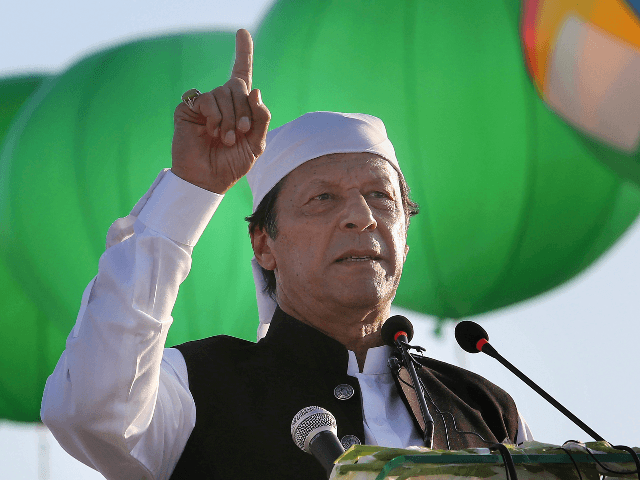Islamist Prime Minister Imran Khan of Pakistan wrote in a Washington Post opinion column on Monday that the Taliban “must be included in any [Afghan] government for it to succeed.”
Khan, who has referred to late al-Qaeda terrorist mastermind Osama bin Laden as a “martyr” and regularly promotes the creation of a global law against criticizing Islam, praised his own government for doing “a lot of real diplomatic heavy lifting” to bring an end to the Afghan War, begun in the aftermath of bin Laden’s attacks on the U.S. homeland in 2001. His column insisted Pakistan would “have no favorites” in the resolution of the war and instead “will work with any government that enjoys the confidence of the Afghan.”
The government of former American President Donald Trump, in a historic deal with the Taliban terrorist organization and the legitimate government of Afghanistan, agreed last year to fully end its military presence in the country on May 1, 2021, after two decades in the country. The Taliban, in turn, agreed to cut ties to international jihadist organizations like al-Qaeda and stop attacking U.S. troops.
President Joe Biden announced in April that he would break the deal and extend America’s military presence in the country through the 20th anniversary of the September 11, 2001, al-Qaeda attacks. The Taliban responded with a statement declaring Biden’s violation of the agreement allowed for “every counteraction” against U.S. troops and a terrorist campaign to seize as much territory away from the legitimate government in Kabul as possible prior to September. Taliban spokesmen have published statements urging foreign governments not to withdraw their diplomatic presence from the country, instead urging them to cooperate with Taliban leaders, and vowing not to kill Afghans who collaborated with the U.S. government during the war. Some reports indicate Taliban terrorists have also attempted to launch diplomatic negotiations behind the scenes with neighboring countries like India.
In his column on Monday, Khan took credit for the Taliban’s growing influence through negotiations.
“We oppose any military takeover of Afghanistan, which will lead only to decades of civil war, as the Taliban cannot win over the whole of the country, and yet must be included in any government for it to succeed,” the prime minister wrote. “This is why we have done a lot of real diplomatic heavy lifting to bring the Taliban to the negotiating table, first with the Americans, and then with the Afghan government.”
“We know that if the Taliban tries to declare a military victory, it will lead to endless bloodshed. We hope the Afghan government will also show more flexibility in the talks, and stop blaming Pakistan, as we are doing everything we can short of military action,” Khan urged.
Khan also adamantly rejected the possibility of allowing U.S. troops to conduct operations in Afghanistan from Pakistani territory. The head of the Pentagon’s Central Command Gen. Kenneth F. McKenzie, Jr., suggested in April that the military is seeking to relocate some troops being withdrawn from Afghanistan to countries surrounding it, allowing for “counter-terrorism operations” and “targeted raids” inside the country.
“If Pakistan were to agree to host U.S. bases, from which to bomb Afghanistan, and an Afghan civil war ensued, Pakistan would be targeted for revenge by terrorists again,” Khan argued. “We simply cannot afford this. We have already paid too heavy a price. Meanwhile, if the United States, with the most powerful military machine in history, couldn’t win the war from inside Afghanistan after 20 years, how would America do it from bases in our country?”
Khan’s reluctance to aid in any operations against the Taliban comes as Afghan media outlet Tolo News reported Monday that the Taliban has successfully conquered at least 50 Afghan districts in the two months since Biden announced he would prolong the Afghan war, “many of them without resistance by [Afghan] security forces.” The Long War Journal (LWJ) similarly reported last week that the Taliban was experiencing tremendous success in expanding its influence and now controls more Afghan districts than the legitimate government in Kabul, though Kabul still has control over a larger percentage of the country’s population than the jihadist group.
Reports indicate that, despite Khan’s insistence that Pakistan is not choosing “favorites” in the war, the Taliban is experiencing an increase in donations from allies on the other side of the Afghan-Pakistani border as a result of its success on the battlefield.
“Multiple sources and eyewitnesses on the ground with knowledge of these donations have confirmed to VOA that fundraising for the Taliban has continued in various parts of Pakistan,” Voice of America reported this weekend.
“They are coming on motorbikes and asking larger stores for contributions. They say that they belong to the Taliban movement and that they are fighting in Allah’s path,” an anonymous border resident told the outlet. “In the past, they were coming to a few mosques. But recently they have started coming to collect contributions from shops.”
“It’s not a secret,” the source added.
Local Pakistani authorities denied the reports and claimed that they had “no such information” about Taliban fundraising in Pakistani territory.

COMMENTS
Please let us know if you're having issues with commenting.